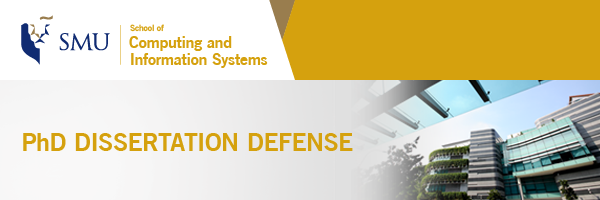| |
 |
|
|
Towards Explainable Neural Network Fairness
|
|

|
ZHANG Mengdi
PhD Candidate
School of Computing and Information Systems
Singapore Management University
|
| Research Area
Dissertation Committee
Research Advisor
Dissertation Committee Member
External Member
- Yu HAN, Nanyang Assistant Professor, School of Computer Science and Engineering, Nanyang Technological University
|
|
|
| Date
5 January 2024 (Friday)
|
| Time
10:00am – 11:00am
|
| Venue
Meeting room 5.1, Level 5
School of Computing and Information Systems 1, Singapore Management University, 80 Stamford Road Singapore 178902
|
|
Please register by 4 January 2024.
We look forward to seeing you at this research seminar.

|
|
|
|
| About The Talk
Neural networks are crucial in addressing real-world problems but suffer from vulnerability to attacks, opacity, and fairness concerns. Discrimination has been observed in various machine learning models, including Large Language Models (LLMs), which calls for systematic fairness evaluation before their deployment in ethic-relevant domains. When bias is detected, we must methodically enhance fairness.
My dissertation develops techniques to detect and rectify fairness issues in neural networks in a transparent, systematic manner. Initially, we created a method to explain neural network decisions through simple, insightful rules, tackling the "black-box" nature that can lead to bias. The second study introduces a rule-based framework, TestSGD, to pinpoint and measure hidden group discrimination, characterized by interpretable rules and quantified by a fairness score with theoretical error bounds. The third study develops an approach which explore the causes of fairness issue and mitigate them systematically. After evaluating the efficacy of existing fairness methods, which are often ineffective, we present an adaptive method, guided by causality analysis, to choose the most suitable fairness enhancement tactic based on the distribution of biased neurons and attributes. Finally, we present a method which would allow us to extend our fairness mitigation approach to LLMs. We propose a non-intrusive bias mitigation strategy for LLMs, leveraging a parameter-efficient debias adapter that systematically mitigate biases and offers theoretical guarantees during the debiasing process. This approach is non-intrusive which does not require accessing or modifying the internals of LLMs.
|
|
| Speaker Biography
Mengdi Zhang is a PhD candidate in computer science at SMU School of Computing and Information System, supervised by Prof. Jun SUN. Her research interests are mainly in advancing the fairness and interpretability of neural networks, covering researches like creating testing methodologies for subtle group discrimination in neural networks, testing and enhancing their interpretability and designing a debias adapter for large language models. She have authored several high-quality papers that have been published in top journal and top conference.
|
|